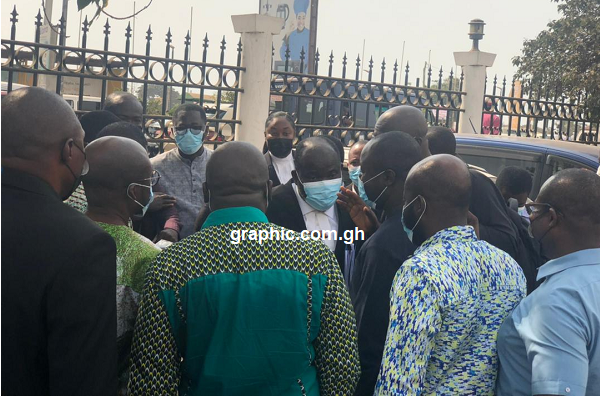
Court orders UTAG to suspend strike
Students of public universities can heave a temporary sigh of relief because the nearly five-week strike by the University Teachers Association of Ghana (UTAG) has been put on hold by the Accra High Court.
The Labour Division of the Accra High Court on Tuesday put an injunction on the strike after it upheld an interlocutory application by the National Labour Commission (NLC).
Per the decision of the court, presided over by Justice Frank Aboadwe Rockson, UTAG is to suspend its strike immediately and go back to the lecture halls.
In addition, the lecturers cannot embark on any strike until the final determination of an application filed at the court by the NLC.
The NLC filed the application for an order of the High Court to enforce its (NLC) directive for UTAG to call off its strike and return to the negotiation table with the government.
Advertisement
Court ruling
Delivering the ruling, Justice Rockson said the court, in its wisdom, had, on two occasions, advised the parties to settle the dispute out of court.
Based on its directive, he said, various rounds of negotiations had taken place between the government and UTAG, and there were indications that negotiations were still ongoing.
It was the considered view of the court that it was in the interest of justice for an injunction to be placed on the strike for negotiations to continue unimpeded, in line with Section 161 of the Labour Act, 2003 (Act 651).
“The court finds favour with the application and, therefore, the motion for injunction is granted,” Justice Rockson held.
Per Section 161 of Act 651, “a party to an industrial dispute shall not resort to a strike or lockout during a period when negotiations, mediation or arbitration proceedings are in progress”.
No breakthrough?
It came up in court that the NLC had, last Monday, actually filed to discontinue the court case on the premise that there was going to be a breakthrough in negotiations between UTAG and the government.
The lawyer for the NLC, Ms Effiba Amihere, however, told the court that her client wanted to withdraw the motion for discontinuance and continue with the case because the basis for the discontinuance had changed.
Counsel for UTAG, Mr Kwesi Keli-Delata, did not oppose the application for the NLC to withdraw its motion for discontinuance.
Subsequently, the court struck out the motion for discontinuance as withdrawn, setting the stage for the case to continue.
When Ms Amihere stood up to move the application for injunction, Mr Keli-Delata rose and objected, arguing that the substantive application should rather be heard first before the injunction application.
He contended that it would be improper for the court to first hear the injunction application because that would effectively mean the substantive application had been determined.
In response, Ms Amihere said Order 25 Rule (1) of the High Court (Civil Procedure) Rules, 2004 (C.I.47) allowed an injunction application to be heard before or after a substantive case.
Justice Rockson upheld Ms Amihere’s arguments and overruled the objection raised by Mr Keli-Delata.
Injunction application
Moving the application for interlocutory injunction, Ms Amihere argued that UTAG had failed to comply with the procedure for embarking on a strike, as stipulated by Act 651.
According to her, UTAG failed to inform the NLC about its intention to embark on an industrial action, and also that when the NLC invited UTAG and directed it to call off the strike for negotiations to continue, the association failed to comply.
“We are urging the court to grant the injunction and restrain the respondent (UTAG) from continuing with this illegal strike,” counsel argued.
For his part, Mr Keli-Delata argued that the primary consideration for injunction was that on the balance of convenience, which of the parties would suffer greater hardship as a result of the injunction?
“At the moment, UTAG, which is on strike, stands to suffer greater hardship if the injunction is granted,” he contended.
Strike
UTAG embarked on the strike on January 10, this year, calling on the employer (government) to restore its members to the 2013 Interim Market Premium (IMP) of 114 per cent of basic salary.
The labour union also wants the government to go ahead to formulate guidelines to implement the appropriate recommendations to address the general conditions of service of the university teacher.
UTAG contends that till date, the determination has not been made, which has resulted in the erosion of the university teacher’s salary.
The NLC, the statutory body mandated to mediate and resolve labour disputes, on January 13, this year, directed UTAG to resume work, on the basis that it was in violation of the law and procedures for embarking on strikes.
It further directed UTAG to formally submit issues it said were in dispute with the government for redress and report back to the commission on February 6, 2022.
However, UTAG disregarded the NLC directive and sustained the strike it started on January 10.
The NLC, therefore, filed an application at the High Court for the enforcement of its directive, in line with Section 172 of Act 651.
Writer’s email: emma.hawkson@graphic.com.gh
